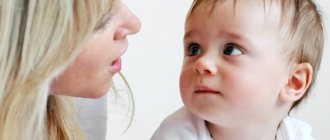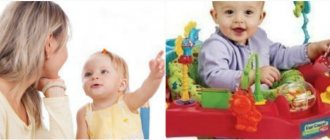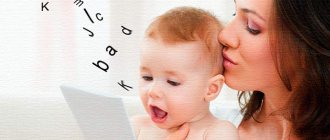From the moment the baby is born, caring parents begin to closely monitor him. They make sure that he grows and develops properly and look forward to their baby speaking. At first, the baby only makes sounds. The process of speech development is quite long. All young parents are interested in when the child begins to speak his first words.
At what months do babies start talking?
Speech is an important tool for communication and socialization.
It begins to develop from birth. First, the baby makes the vowel sounds “a”, “u”. This is how he expresses his needs. From the age of two months, babies become more animated, uttering drawn-out sounds more often, giving them an emotional coloring. They start cooing. By two months, the mother already knows the child well, understands what sounds he uses to express joy, hunger, discomfort, and how he tries to make it clear that he is bored.
At the age of three months, the baby begins to make not only vowels, but also consonant sounds (g, x, k, p, b), and combines them in a certain way (“gu”, “agi”, “agu”). At six months, parents notice the baby's babbling. It differs from humming by the repetition of syllables.
For example, a baby can repeat the sounds “pa-pa-pa”, “ba-ba-ba”, “ma-ma-ma” for a long time. He pronounces them unconsciously. The baby begins to understand what adults are telling him. He develops a passive vocabulary. During this time, it is important to communicate with your child as much as possible.
At seven months, the baby continues to babble. At this age, he begins to play with the timbre and volume of his voice: he drawls out sounds, alternating low and high notes.
A passive vocabulary continues to form. The baby begins to imitate the speech of his parents and the sounds made by adults, animals, and cars.
At 9-10 months, the child pronounces new sounds and communicates with gestures. At this age, he is able to pronounce about 10 monosyllabic words: “woof”, “baba”, “koko”. Girls usually develop speech faster than boys. At what time children begin to speak their first words largely depends on the parents: on how they work with the baby, how they communicate with him.
Physical, intellectual and mental development and hereditary predisposition also have a certain influence. Therefore, it is difficult to give an exact answer as to what time the baby will speak. Caring and persistent parents can speed up the onset of this moment.
The more often a child hears the word “mom,” the faster he will learn to pronounce it.
How to help your child say his first words faster?
Speech is closely related to intelligence, so many parents try to get their baby talking quickly and are very worried if he doesn’t want to do this. Today there are many methods for early speech development. You can choose and try one of them, but just don't overdo it. Sometimes too intense exercises have side effects - the child may withdraw into himself from information overload or stop being interested in the world around him, wanting to learn new words only from his favorite educational cartoons. To understand whether a developmental program is causing harm, carefully monitor your child’s behavior and emotional state, and regularly consult with a specialist.
In addition to the author’s methods, there are also universal tips that help parents hear the baby’s first words faster:
- Do not think that your baby will speak faster if you artificially reduce communication with him to the most primitive words. On the contrary, from birth, try to talk with your child on a variety of topics, even abstract ones.
- If your baby is not sleeping, talk to him constantly. Comment on your actions while playing, feeding or changing clothes. While walking, talk about everything you see - trees and flowers, roads and cars, rain and sun, butterflies and birds. Describe each item - what it does, what color it is, size, quantity, what it consists of, etc. If it is connected with something already familiar to the baby, point out this connection.
- Do not fix simplified forms of words in your child’s mind. If your child calls the cat “ko,” confirm that you understand him and say correctly: “yes, that’s a cat.” And, of course, do not invent such words yourself.
- When children begin to speak, it is important to give them opportunities to gain fresh knowledge. Do not limit yourself to the vicious circle of “house, park, playground.” Take your baby to children's events, the zoo, museums and other places where he can get new experiences.
- Read books to your child, show pictures and explain what is shown in them, sing children's songs, look for videos for children on the Internet. All this stimulates the baby’s interest in mastering speech, expands vocabulary and builds logical connections between various objects, actions, phenomena, and properties.
- Praise your child for his achievements. Even if they are very tiny.
When do children say the word "mom"?
The question of when a child begins to say “mom” is relevant for all mothers. By 10 months, children are already pronouncing monosyllabic words. It is not necessary that a child at this age will say “mom”.
The first word can be “baba”, “dad” or “woof”. But as a rule, by the age of one year, babies already clearly pronounce “mother.” What first word the baby says depends on how the parents communicate with him.
To help your baby start saying “mama” earlier, experts recommend:
- accompany each action with the word “mom” (for example, “mom is feeding Masha”, “mom has come”, “mom is cooking porridge”, “mom is stroking her daughter (son)”);
- play the game “Where is Mom?” Its essence is to cover your face with your hands and ask the baby where mom is. Six-month-old children usually already understand such questions and can point their fingers at people and objects.
Tips for active parents
The development of a baby’s speech directly depends on whether it develops spontaneously, or whether parents take direct part in its development. This determines at what age children begin to speak sounds/words/sentences. Positive conditions for the formation of children's speech:
- There is no need to force speech development with frequent exercises that are not appropriate for the baby’s age - there is a high risk of speech negativism, stuttering and nervous tics, since the capabilities of the child’s brain are not limitless.
- There is no need to lisp, faking your speech as a child’s speech, and often use diminutive suffixes - the only thing worse than this can be a complete disregard for communication.
- Delicately correct speech mistakes made by your child, never make him laugh, but show him an example of the correct pronunciation of a given speech utterance. For example, I see houses, yes, you see houses.
- Protect your baby from communicating with people with speech defects (burr, stutter), and especially with illiterate speaking adults (put down - lies, mouths - mouths, beautiful cat - beautiful cat), this “infects” and “invades” children’s speech so much that Such imitations are eradicated with great difficulty.
- When reading children's works, watching cartoons with your child, always explain unfamiliar words, the actions of the characters, and pay attention to vivid turns of speech.
It is very useful to record and listen to the baby’s speech every month - humming, babbling, first phrases, reading poetry. Such an archive will one day become an excellent gift for an older child and your grandchildren.
Today we answered the question of when should a child start speaking and at what months do the first sounds appear. If you suspect a delay in speech development in your baby, consult us. We will dispel anxiety, and if it is objective, we will tell you how to talk or simply teach your child to speak. We know more than a dozen examples of how parents sit and wait for their child to speak at 3, 4 and even 5 years old, although the development of big problems is already clearly visible. Ask us, we've been doing this all our lives!
Average age for children to develop conscious speech
At 9-10 months, babies pronounce words unconsciously.
They only pronounce various syllables and imitate the speech of their parents. But the baby already understands what adults are telling him, and his vocabulary continues to expand. Already by 11-12 months, the baby begins to pronounce simple words consciously. Usually these are “mother”, “father”, “woman”, “grandfather”, the names of favorite toys, animals. In total, there are approximately 10 words in the lexicon. By the age of one and a half years, a child can consciously pronounce about 20 words.
By the age of two, many children can already form simple sentences. To stimulate the development of conscious speech in a child, it is necessary to conduct educational activities in the form of a game. For example, Doman cards develop a child well.
They are bright pictures of different subjects (weather, animals, vegetables). It is necessary to show them to the baby and at the same time name what is depicted on them. It is important to talk to your baby as often as possible. When communicating, you should use simple words.
The baby begins to consciously pronounce words closer to 11-12 months.
Signs of delay in speech development
Parents and kindergarten teachers should clearly know the signs of deviations in the development of speech function. This will help to identify violations in time and help the child. Signs of deviations are prescribed for each age, which is explained by the rapid development of the baby up to 2-3 years of age.
Signs of violations:
- At one month of age, the baby does not cry on the eve of feeding.
- At 4 months of age, the baby cannot smile or walk.
- At 5 months, he does not look for people or objects that his mother names while holding him in her arms, and does not listen to music.
- At 7 months of age, the child does not recognize relatives, cannot respond adequately to intonations, and does not play with rattles or musical toys.
- By the age of 9 months he does not babble, does not repeat syllables and words after relatives.
- By 10 months of age, the child does not shake his head in denial or wave his hand when someone leaves.
- By the age of one year, he does not speak or babble at all, and does not perform simple tasks.
- At 1 year 4 months. uses the words “mom” and “dad” inappropriately.
- At 1 year 9 months. The baby does not say 6 meaningful words.
- By the age of 2, the child does not show parts of the body (arms, legs, head, nose, eyes, fingers), and is not able to complete complex tasks: “Go to the room, bring a toy.”
- By the age of 2.5 years, the baby does not understand the difference between a small and a large object.
Periods of crisis in the development of a child’s speech
Pediatricians distinguish three critical periods in the development of speech, during which particularly intensive development occurs and at the same time there is an increased sensitivity of the nervous system to unfavorable factors.
It is important to know these stages and be attentive to your baby when they occur. It is important to know the critical stages and be attentive to the baby when they occur:
- The first critical period is observed at 1-2 years. At this time, the active development of cortical speech zones occurs. The influence of unfavorable factors can cause RRD or alalia;
- the second period is 3 years. Intensive development of speech is observed. At this time, stuttering and mutism may occur;
- the third lasts from 6 to 7 years. At this age, central nervous system disorders are possible, leading to stuttering. With organic damage to the brain, aphasia occurs.
3-5 years
By the age of 3, the baby actively talks with adults and can ask and answer in long sentences of 5-7 words. He can say his name, age, and even address. It will be good to remember the book that was read to him
The child’s speech is full of verbs, adjectives, numerals and other words. The sentences themselves resemble the speech of an adult, but the endings are often broken and there are other lexical errors. The kid knows all the colors and pronouns well. Errors gradually disappear from speech. Speech skills improve and mature at 4-5 years of age.
Video on the topic
At what time do children begin to speak their first words? answer in video:
Thus, the child begins to pronounce his first words at about nine months of age. They are repeated syllables that the baby pronounces unconsciously. During this period, parents can hear “mom,” “baba,” and “dad.” Some children experience developmental delays.
They can be triggered by hearing impairment, lack of parental attention and other social, psychological, pathological and physiological reasons. In order for a child to start speaking faster, it is necessary to communicate with him more and conduct developmental activities.
Variants of the first words
Daily routine of a 5 month old baby
Statistics say that the first word in the vocabulary of 70% of children under one year old is “mom.” However, this is not at all necessary. Other options are also possible: “nanny”, “woman” or even “kisya” (if the baby is shown a cat every day and repeats its name). The first word can be any word, except those that contain consonant sounds that are difficult to articulate: “sh”, “sch”, “ts”, “r”. A young car lover can say “beep” for the first time; a girl, seeing a beautiful doll, can say “lala.” If the mother is often away, the baby may be the first to name the adult with whom he communicates most: these are grandmothers, aunts, brother or sister (“Anya”, “Lelya”, “Yulia”). Therefore, you should not wait for the child to say “mom”. Perhaps he will say a completely different word first.
In “children’s” language, the baby tries to name everything that interests him
Interesting. The baby's articulatory apparatus develops gradually. At first he pronounces only sounds (the so-called “humming”), then the consonants “m”, “n”, “l” are added to them, as the most convenient for pronunciation. Perhaps this is why the word “mother” sounds similar in all languages of the world - the sounds “m” and “a” are the easiest for a baby to pronounce.
First lessons
Sounds, humming and babbling are an important component of preparing the vocal apparatus for future speech. The sounds are more reflexive in nature and are associated with the needs of the baby.
At this time, the first word of a small child is pronounced - “agu”. The baby begins to walk at one and a half months. At first these are drawn-out sounds: aaaa, uuu, auuu. By three months, the syllables “abu”, “agu”, etc. appear. By six months, the baby will begin to sing, pronouncing sounds with changing intonation. By 6 months babbling will appear, and by 9 months the long-awaited “mother” will appear.
The baby talks only if he is comfortable. After making sure that he is not hungry, he is warm and dry, sit next to him, bend over and quietly make sounds. The baby will definitely answer you.
You need to talk to your newborn gently and with a smile, responding to all the sounds he makes. Respond with a smile, and if the baby wants to chat, put off urgent matters. Repeat aga, changing combinations of sounds, and the baby will repeat after you.
Why do babies choose “Aga”? All sounds pronounced by newborns are guttural. The articulation of the sounds [a], [u] is more like “g-gu” or “g-ha”, so their reproduction is easier for the baby. At first, the sounds are pronounced reflexively, but after lengthy training, the baby begins to attach emotional coloring to his “ahu” in a conversation with his parents.
Helping the little “silent one”
It happens that parents are actively engaged with their baby: they sculpt, draw, sing songs and read fairy tales, but the boy (girl) is still silent. To gently and unobtrusively help your baby learn to speak, you need to:
- Visit an orthodontist and dentist (speech delay may be caused by problems with teeth or bite);
- Start weaning off the pacifier (prolonged pacifier sucking can significantly slow down speech development);
- Ask the child more often what exactly he wants, so that the baby does not show with gestures, but names objects in words;
- Tell your child about everything he sees at home, on a trip, on a walk.











